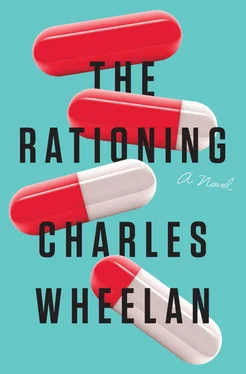The President’s senior advisers were feeling the same sense of doom that had descended on me the day before. At previous junctures in the crisis, we could imagine developments that would bail us out: Dormigen from allies; China; a scientific breakthrough on the virus. Each of those options was now gone, or dwindling away. The bravado of the takeoff to Australia had bought some political breathing space, but it had done nothing to improve Cecelia Dodds’s condition. The hourly update from that Seattle hospital now became a barometer of the nation’s future. Meanwhile, the press had begun to ask what the President could accomplish in Australia. And whatever goodwill the President had amassed by standing up to China would dissipate immediately as Americans began dying in serious numbers. The Chief of Staff would later describe the mood as “an oppressive anxiety as we internalized the reality of what was likely to happen.”
“I need to draft remarks for the congressional briefing,” the Communications Director said. He looked around the room for some general guidance to get him started. Curiously, the Strategist had gone missing. The President’s more substantive advisers typically considered the Strategist an irritant, not just because of his irreverent demeanor, but also because he was a constant reminder of the messiness and tawdriness of politics. He was the one who explained impatiently why high-minded policies would have “absolutely no fucking support” in most of the Midwest, or how information could be cleverly spun to obscure, confuse, or persuade. He had famously called the Secretary of Energy a “total moron” for using the word “tax” to describe the administration’s carbon tax proposal. One might assume that the word “tax” was an accurate and efficient way to describe a policy that was, in fact, a tax on carbon emissions. “It’s a pollution fee,” the Strategist yelled during a staff meeting. “Tell the jackasses at the EPA to stop calling it a tax.”
“Which part of it is not a tax?” a young economist from the Council of Economic Advisers had made the mistake of asking. The Strategist had literally thrown a bundle of papers across the conference table at him.
“Read that, you smug prick!” the Strategist screamed. Behavior aside, the public opinion data he had thrown across the table confirmed his point. Only 23 percent of the American public supported a carbon tax. But when the exact same policy was described as a “fee on polluters,” support climbed to 68 percent. “If you want to sit alone in your office doing mental masturbation, go back to Harvard,” the Strategist told the young economist (who was from Stanford). “If you want to improve American energy policy, don’t use the word ‘tax.’ Not fucking ever .”
The more cerebral members of the President’s team bristled at the manipulation, clinging to the politically naïve notion that a policy was just a policy, regardless of the words one used to describe it. They would appear on the Sunday morning talk shows, awkwardly trying to explain how the President’s proposed tax on carbon was not a tax. The host would probe relentlessly: “If the government imposes a charge on the emission of carbon, how is that not a carbon tax ?”
The Secretary of Energy or the Chair of the Council of Economic Advisers or the head of the EPA would parry uncomfortably: “What we are proposing is a fee on polluters.”
“What’s the difference between a tax and a fee ?”
“A fee is a charge levied on some activity, such as registering a car. The most elegant part of the President’s proposal is that the biggest polluters will pay the largest fees.”
“How is that any different than the income tax, where those with the highest incomes pay the most in taxes?”
“Because this is a fee, not a tax.”
And so it would continue. The cerebral advisers would apologize to their erstwhile academic colleagues for such silliness. The fact that the Strategist was generally right on these matters was no salve for wounded academic dignity. Congress eventually passed a modified version of the “carbon emissions fee,” with many members declaring to their constituents that they were supporting it because it was not a tax.
Now, with the Communications Director trying to put a positive spin on a minimum of forty-five thousand deaths, the senior advisers were looking for some guidance from the Strategist. “He needed some rest,” the President said, explaining the absence unconvincingly.
“We all need some sleep,” the Communications Director said. “Can we at least test the language?”
The Chief of Staff, sitting nearby but not following the conversation, said to no one in particular, “It’s my daughter’s birthday.”
The President ignored her. “Just draft a straightforward statement,” he instructed the Communications Director.
“Excuse me,” the Chief of Staff said as she got up and walked out of the cabin.
The Communications Director looked around the room. “We’re talking about a minimum of forty-five thousand premature deaths. What am I supposed to say?”
“We need to prepare the country for the worst,” the President replied. He outlined a rough plan. The Acting HHS Secretary would brief Congress on the basic details: the state of our Dormigen supplies; the nature of Capellaviridae ; the steps that had been taken to minimize the adverse effects of the Outbreak. Those details would be released to the public immediately following the briefing and the President would address the nation after that. “This is the reality of the situation,” the President stated. “We shouldn’t try to sugarcoat it.”
He was right, of course. How could one put a positive spin on an outbreak that might kill over a hundred thousand people—however weak, old, or sick those people may be? The advisers who had been working around the clock to avert this moment were loath to concede that their efforts had been fruitless. “I still think we need to pay attention to how we explain this,” the Communications Director said, implicitly probing the Strategist’s absence.
“He’s not here,” the President said tersely. “Just do your job.”
The Secretary of State had also gone missing, but her absence would not be noted for some time.
I AWOKE FEELING DIFFERENT THAN I HAD IN DAYS. I COULD remember my dreams, one of which had been about a giant chocolate almond ice-cream cone. If I had been in a soap commercial, I would have danced around the bedroom singing about how refreshed I felt. I reached for my phone on the bedstand; there were eighteen texts from various people at the NIH headquarters. I had told the NIH Director that I needed a morning to sleep and think. She agreed it was a good idea, but as the Dormigen deadline drew nearer without any meaningful progress on our part, the staff had begun to confuse motion for progress. Only one of the texts required any real input from me; the others either boasted of some new activity or posed questions with answers that were self-evident. Ellen had already gone to work. She left a note at the foot of the bed wishing me a good day and telling me that she had made an omelet that I could heat up in the microwave. “Sorry if I have not been as supportive as I should be!” it concluded, with a little smiley face. That just made me feel bad, particularly as I texted Jenna before leaving the apartment.
I put the omelet in the microwave and wandered over to the window while it heated up. We lived on the fourth floor, high enough to get a decent sense of the activity below. Three boys in Catholic school uniforms hustled along the sidewalk. They had to be late, I thought. Across the street, a bakery truck was double-parked as two guys unloaded trays of bread onto a trolley and wheeled it into a small convenience store. The initial panic of the Outbreak had given way to normalcy, mostly because people could not see anyone getting sick around them. This stiff upper lip was less about resolve in the face of adversity and more about a failure to imagine how bad things could get when the Dormigen supply was depleted, a contingency that most people now did not think was going to happen. The White House had also worked aggressively to make Capellaviridae seem less scary. Acting on the recommendation of the Strategist, senior officials had compared Capellaviridae to influenza at every possible turn. (To be more accurate, they compared it to “the flu,” which focus groups found far less scary than “influenza.”) For example, the day before, with the press clamoring for projections and details, the Communications Director had declared during an interview, “It is crucial to remember that even if untreated, Capellaviridae is no more harmful than a serious case of the flu.”
Читать дальше












